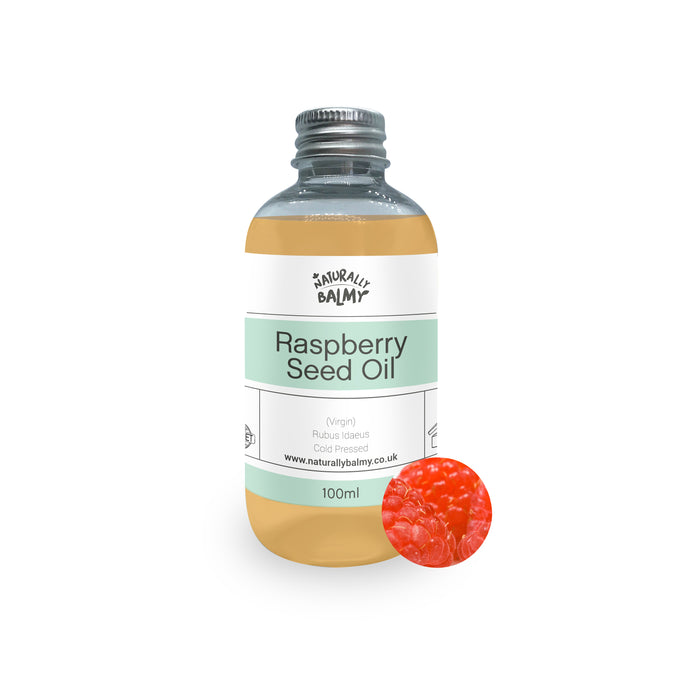INCI name
Rubus Idaeus
What is Raspberry Seed Oil?
This virgin, natural oil has a high content of regenerating and protecting components. Alpha and gamma tocopherols (Vitamin E), Vitamin A and Omega 3 and 6, provide superior antioxidant properties, and this high level of Vitamin E is also known to have an important role in skin repairing and conditioning.
This oil contains more than 80% essential fatty acids and Omega 6 fatty acids are typically present at a level of 50%-60%. This makes it one of the most active vegetable oils on the market. The composition of omega 3 and 6 fatty acids has been shown to reduce the effects of oxidative stress in skin. It is rich in Alpha Linolenic Acid, suggesting pronounced anti-inflammatory and healing properties. Thus, Raspberry Oil is particularly known for the treatment of rashes, eczema, psoriasis and other skin lesions.
What are the benefits of using Raspberry Seed Oil on your skin?
It is emollient, lubricating, and conditioning and so creates a lipid barrier providing protection to the skin and moisture retention for the skin. Ideal for dry, tired, mature and damaged skin and also used for oral care in toothpaste as anti-microbial and for the prevention of gingivitis.
Raspberry Seed Oil may act as a broad-spectrum UV-A and UV-B shield. Some reports show that it has an SPF of between 28 and 50, however more recent information indicates much lower SPF values. Sun protection is crucial to prevent skin cancer. But while Red Raspberry Seed Oil does offer some UV protection, the protection is not enough to protect the skin from sun damage. In the latest study SPF values of the RSO in vitro was 0.4, in vivo 2.6, and it is significantly lower than the values reported in the controversial studies. The overestimated SPF values of RSO was determined by authors who did not strictly follow the optimum methodology. Raspberry Seed Oil, though, may help with altering UV rays’ damage.
It is also becoming popular with massage therapists for its skin healing properties, though it is typically in dilution (10% recommended). It is highly recommended for use in cosmetics and skin care, and is a key ingredient in creams, lotions, massage oil, face oil, and body oil.
What are the benefits of using Raspberry Seed Oil on your hair?
Helps to keep hair moisturised and improve hair growth, while also nourishing the scalp.
What does Raspberry Seed Oil look like?
An amber to pale yellow liquid.
What does Raspberry Seed Oil smell like?
A pleasant, slightly earthy aroma.
How to use Raspberry Seed Oil
Use up to 100% of this oil, although when used neat it can have a tight feeling on the skin. It is not heat stable so should be used in phase 3 (cool stage).
History and origins of Raspberry Seed Oil
The species name of the raspberry, "Idaeus", comes from its discovery on Mount Ida near Troy in northern Turkey, the scene of Greek mythology. According to legend, the fruit derives its red colour from the blood of Ida, daughter of the King of Crete and nurse of Zeus. Wanting to calm Zeus down, she picked some raspberries which until then had been white in colour, she then scratched her breast which coloured the fruits red when it bled. The fruits oil has been used in cosmetics on more recent years due to its moisturising properties.
How is Raspberry Seed Oil made?
Made from pressing the dried seeds from raspberries. The seeds are a waste product of the food and juicing industry, while the residual “cake” is used as animal feed.
Is Raspberry Seed Oil suitable for vegans?
Yes.
Fatty acids
Linoleic Acid (Omega 6) – 45-55%; Alpha Linolenic Acid (Omega 3) – 28-36%; Oleic Acid (Omega 9) – 8-14%; Palmitic Acid – 2-5%; Stearic Acid – no more than 3%.
Natural contents
Vitamin A and E, Omega 3 and 6, Alpha Linolenic Acid.


